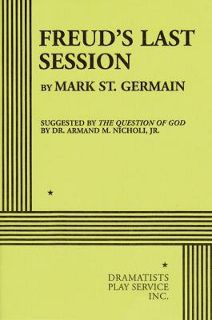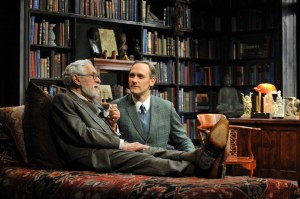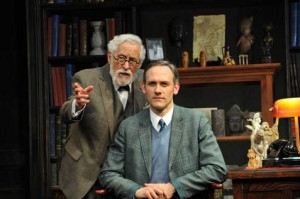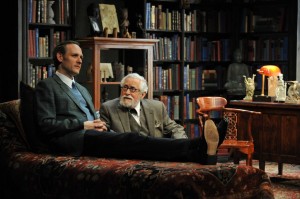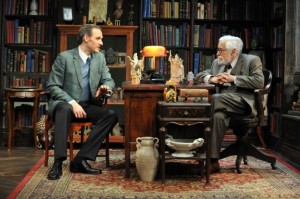YOU BETTER CATCH THIS
BEFORE IT REALLY IS THE LAST SESSION
Mike Nussbaum is probably weary of hearing himself called the Grand Old Man of Chicagoland Theater and a local treasure, like Wrigley Field. But consider the record. Nussbaum has provided local audiences with superior performances for nearly 50 years. Those unfortunates who missed him over the previous decades can sample his brilliance as one-half of the cast of Freud’s Last Session, which opened at the Mercury in March with the original New York cast of Martin Rayner and Mark H. Dold. Once the production was established, a local cast replaced the originals, consisting of Nussbaum as Sigmund Freud and Coburn Goss as English author C. S. Lewis. The new duo doesn’t miss a beat, and indeed the show seems a little sharper and even more stimulating.
The Mark St. Germain play takes place on Sept. 3, 1939, in Freud’s study in London, shortly after the great psychoanalyst and author fled Nazi persecution in Vienna. World War II is about to break out and the dialogue between the two men is periodically interrupted by BBC radio broadcasts verbally charting the imminent start of the war after Germany’s invasion of Poland.
Freud is near the end of his life, dying in agonizing pain from oral cancer. He is 83 and world famous. Lewis is 41 and just starting his to make his mark in British intellectual and literary life. “The Screwtape Letters” and “The Chronicles of Narnia” are still ahead of him.
Lewis visits Freud at the great man’s invitation. Freud is a confirmed and outspoken atheist and Lewis is a committed Christian. The gulf between believer and unbeliever fires most of the dialogue during the 80-minute play. The two men, each articulate and passionate, go back and forth in debating original sin, free will, sex, whether or not God exists, the Devil, suffering and pain’”the standard theological issues.
As I noted in my first review, the exchanges between Freud and Lewis grow heated, but the verbal combatants never lose their manners. The play reminds the audience how highly charged and emotional issues can be approached by opposing sides without descending into abusive insults and personal attacks. Naturally, neither side convinces the other of his point of view, but both give as good as they get. The script often injects humorous banter into the discourse, preventing the play from turning into an academic exercise of stiff religious position papers.
The Freud character tends to dominate the play because most of the humor resides with him as an endearing curmudgeon, and the skeptic is always more entertaining than the true believer. Plus we have to sympathize with his pain as cancer eats away at his jaw. Three weeks after the end of the play’s action, Freud ordered his doctor to give him a fatal injection of morphine.
Nussbaum nails every facet of Freud’s character’”the man’s intellectual brilliance, his droll humor, the intensity of his atheism, his pessimism over mankind’s destructive nature, and his love of a good high stakes debate. Plus, he makes Freud’s physical pain palpable to the viewer. It’s a wonderfully well-rounded performance, not too doctrinaire and not too pixyish.
In a role bound to be overshadowed by the more theatrical Freud, Goss’ C. S. Lewis is much more than a foil for the psychoanalyst’s wit and brilliant mind. While deferring to the older and more eminent man, Goss’ Lewis yields nothing in the intensity of his religious belief. It’s a more even battle than I recall at the March opening, enriching the texture of the discussion. There is a warmth and sensitivity to the Goss performance that saves him from sounding like a priggish zealot.
Brian Prather’s book-lined study provides the perfect backdrop for the duel of wits and ideas. Mark Mariani designed the costumes, Clifton Taylor the lighting, and Beth Lake the sound. Tyler Marchant’s directing is unobtrusive, sustaining the necessary atmosphere of realism and allowing the language to crackle without directorial intrusion.
My view of Freud’s Last Session remains unchanged from the March opening. It’s an adult play in the best sense of that much abused term. The dialogue is absorbing, often eloquent, and best of all, accessible’”regardless of the audience’s religious convictions and how wary they are of highbrow plays. It earns repeated viewings on its merits as literate and challenging theater, and it’s absolutely worth attending now for the superior acting by Nussbaum and Goss.
Freud’s Last Session
Mercury Theater Chicago
ends on November 11, 2012
for tickets, call 773 325 1700 or visit Mercury
for more shows, visit Theatre in Chicago
